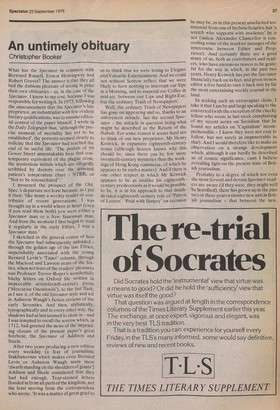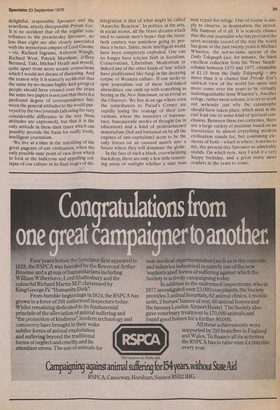An untimely obituary
Christopher Booker
What has the Spectator in common with Bertrand Russell, Ernest HemingwaY and Robert Graves? The answer is that they all had the dubious pleasure of seeing in print their own obituaries — as, in the case of the Spectator, I know to my cost, because I was responsible for writing it. In 1973, following the announcement that the Spectator's late proprietor, an industrialist with few evident literary qualifications, was to assume editorial control of the paper himself, I wrote in the Daily Telegraph that, 'although the precise moment of mortality has yet to be established', the portents seemed clearly to indicate that the Spectator had reached the end of its useful life. 'The portals of 99 Gower Street unmistakably bear that contemporary equivalent of the plague cross, the mysterious initials which are allegedly scribbled by doctors over the terminal patient's temperature chart — NTBR, or "Not to be rescuscitated".'
I mourned the prospect of the Old. Spec.'s departure not least because, as I put it then: 'like many a weekly reader or contributor of recent generations, I was brought up in a world where at heart (even if you read them both) you were either a Spectator man or a New Statesman man. And from the moment I first began to read it regularly in the early Fifties, I was a Spectator man.'
I sketched in the general course of how the Spectator had subsequently unfolded — through the golden age of the late Fifties, imperishably associated with the young Bernard Levin's 'Taper' column, through the Macleod and Lawson years of the Sixties, when not least of the readers' pleasures was Professor Trevor-Roper's wonderfully bitchy letters on Oxford life written in impeccable seventeenth-century prose (Mercurius Oxoniensis'), to the last flash, as I saw it, of the old Spectator style and wit in Auberon Waugh's fiction reviews of the early Seventies. And then, stylistically, typographically and in every other way, the shadows had at last seemed to close in —and I was tempted to recall the sorrow which, in 1712, had greeted the news of the impending closure of the present paper's great forebear, the Spectator of Addison and Steele.
After two years producing a new edition every weekday (a feat of journalistic Stakhanovism which makes even Bernard Levin or Auberon Waugh seem mere 'dwarfs standing on the shoulders of giants') Addison and Steele considered that they had had enough. Tear-stained letters flooded in from all parts of the kingdom, not the least moving from the correspondent who wrote: 'It was &matter of great grief to us to think that we were losing so Elegant and Valuable Entertainment. And we could not without Sorrow reflect that we were likely to have nothing to interrupt our Sips in a Morning, and to suspend our Coffee in mid-air, between our Lips and Right-Ear, but the ordinary Trash of Newspapers'. Well, the ordinary Trash of Newspapers has gone on appearing and so, thanks to an unforeseen miracle, has the second Spectator — the miracle in question being what might be described as the Return of the Nabob. For some reason it seems hard not to think of our new proprietor, Mr Henry Keswick, in expansive eighteenth-century terms (although heaven knows why this should be, since there can be few more twentieth-century mysteries than the workings of Hong Kong commerce, of which he appears to be such a master). And if there is one other respect in which Mr Keswick appears to be as unalike his eighteenth century predecessors as it would be possible to be, it is in his approach to that muchderided eighteenth century role of 'Patron of Letters'. 'Paid with flattery' on occasion he may be, as in this present unsolicited testimonial from one of his beneficiaries, but 'a wretch who supports with insolence' he is not (unless Alexander Chancellor is concealing some of the murkier passages of the intercourse between Editor and Proprietor). And certainly there are a good many of us, both as contributors and readers, who have enormous reason to be grateful for the way in which, in the past two years, Henry Keswick has put the Spectator financially back on its feet, and given its new editor a free hand to turn it back into by far the most entertaining weekly journal in the land.
In making such an extravagant claim, I take it that I am by and large speaking to the converted (with the exception of the cheeky fellow who wrote in last week complaining of my recent series on Socialism that he found my articles on 'Capitalism' incomprehensible — I know they were not easy to follow, but not surely as impenetrable as that). And! would therefore like to make an observation on a strange development which, although it can hardly be described as of cosmic significance, casts I believe revealing light on the present state of British journalism.
Probably to a degree of which not even the most fervent and devout Spectator readers are aware (if they were, they might well be horrified), there has grown up in the past two or three years a sinister new axis in British journalism — that between the new, delightful, responsible 'Spectator and the scurrilous, utterly disreputable Private Eye. It is no accident that of the regular contributors to the present-day Spectator, no less than eight are also closely associated with the mysterious empire of Lord Gnome — viz. Richard Ingrams, Auberon Waugh, Richard West, Patrick Marnham, Jeffrey Bernard, Taki, Michael Heath and myself, quite apart from more arcane connections which I would not dream of disclosing. And the reason why it is scarcely accidental that the same by-no-means highly-knit group of people should have created over the years the same two papers is not just that there is a profound degree of correspondence between the general attitudes to the world purveyed by the two journals (allowing for very considerable difference in the way !hose attitudes are expressed), but that it is the only attitude in these dark times which can possibly provide the basis for really lively, intelligent journalism.
We live at a time in the unfolding of the great pageant of our civilisation, when the only possible sane point of view from which to look at the ludicrous and appalling collapse of our culture in its final stages of dis integration is that of what might be called 'Anarchic Reaction'. In politics, in the arts, in social mores, all the brave dreams which used to sustain men's hopes that the twentieth century was somehow going to produce a better, fairer, more intelligent world have been completely exploded. One can no longer have solemn faith in Socialism, Conservatism, Liberalism, Modernism or indeed any of the other kinds of 'ism' which have proliferated like fungi in the decaying corpse of Western culture. If one seeks to spin journalism out of these half-baked absurdities, one ends up with something as boring as the New Statesman, or as trivial as the Observer. We live in an age where even the contributors to Pseud's Corner are rapidly losing the courage of their convictions, where the insanities of bureaucracy, bureaucratic modes of thought (as in education) and a kind of proletarianised materialism (fed and battened on by all the engines of late-capitalism) seem to be the only forces on an onward march into a future where they will dominate the globe. In the face of such a black, overwhelming backdrop, there are only a few little remaining areas of sunlight whither a sane man may repair for refuge. One of course is simply to observe, in desperation, the incredible humour of it all. It is scarcely chance that the one journalist who has provided the most accurate record of the way the world has gone in the past twenty years is Michael Wharton, the not-so-tame satirist of the Daily Telegraph (see, for instance, the latest excellent collection from his 'Peter Simple' column between 1975 and 1977, obtainable at £1.15 from the Daily Telegraphs) — any more than it is chance that Private Eye's satirical view of the world has more and more come over the years to be virtually indistinguishable from Wharton's. Another refuge, rather more solemn, is to try to work out seriously just why the catastrophe should have taken place, which must in the end lead one to some kind of spiritual conclusion. Between these two extremes, there are a large variety of positions based on an irreverence to almost everything modern civilisation stands for, but combining elements of both — which is where, it seems to me, the present-day. Spectator so admirably stands. On which note, may I wish it a very happy birthday, and a great many more readers in the years to come.



































































































 Previous page
Previous page